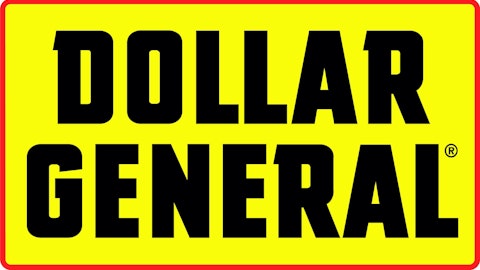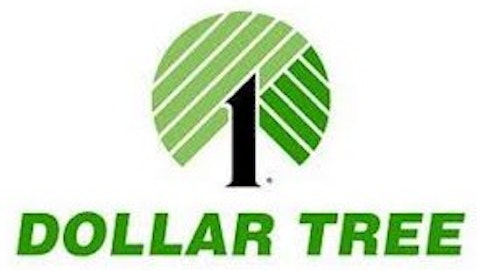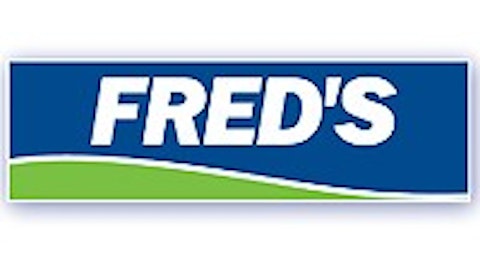
Lack of food
Dollarama’s dollar stores have an edge over closeout stores in terms of product selection and availability for general merchandise, consumable products and seasonal merchandise. However, Dollarama is at a disadvantage compared with Wal-Mart Stores, Inc. (NYSE:WMT), grocery retailers and other dollar stores, given its lack of food offerings. Besides being a driver of shopper traffic and aiding cross-selling opportunities, food offerings, in particular fresh food, also offer higher margins. If and when Dollarama decides to offer a range of food items to its customers, it will be a major overhaul involving huge capital outlays, in particular in the area of distribution. Dollarama currently has only one distribution facility in Montreal, Quebec, from which it distributes 90% of its products to its stores using third party contractors.
Race to the bottom for retail space
Dollarama has set itself a target of opening 50-60 stores per year, but the limiting factor is retail space. The competition for retail space by other dollar store chains is a classic case of “heads you win, tails I lose.” The successful bidder for good locations gets burdened with high rental expenses as a result of competitive bidding, while the loser has to put its growth plans on hold or settle for inferior locations. According to a National Post article, U.S. listed dollar store chain operator Dollar Tree, Inc. (NASDAQ:DLTR) has plans to grow to 1,000 stores in Canada eventually, from its current 100+ stores. Apart from difficulty in securing retail space for new stores, this trend is likely to impact rent hikes for lease renewals. Dollarama leases all of its more than 700 stores, whose leases expire in an average of about five years.
Low cost direct sourcing from China in question
Dollarama sources about half of its merchandise from North American manufacturers and the remaining half from foreign manufacturers – China makes up a majority of this. The appreciation of the renminbi and rising labor costs in China could possibly raise costs and impact Dollarama’s margins. According to its most recent annual report, Dollarama disclosed that it has been increasing the proportion of merchandise sourced from other selected countries in Europe and Asia outside of China. This represents a tacit admission of rising costs in China.
Peer comparison
Dollarama’s peers include dollar store operators Family Dollar Stores, Inc. (NYSE:FDO) and Dollar Tree, Inc. (NASDAQ:DLTR).
Family Dollar Stores, Inc. (NYSE:FDO) operates more than 7,000 stores across 45 states in the U.S. It recently experienced weak home and apparel sales, as its core customers are affected by higher gas prices and increases in payroll taxes. Despite these short term concerns, Family Dollar is focused on expanding its food offerings and accelerating the roll out of tobacco, to drive higher number of repeat visits and higher spend per visit. It quoted a Nielsen study during an investor presentation, that food offerings were the main reason for frequent visits by shoppers. Family Dollar Stores, Inc. (NYSE:FDO) is partnering with McLane Partnership, a supplier of refrigerated and frozen food, and tobacco, to roll out these initiatives.
Dollar Tree, Inc. (NASDAQ:DLTR) runs more than 4,000 states across 48 states in the U.S., and entered the Canadian dollar store market in 2010 with the acquisition of Dollar Giant in November 2010. Unlike Dollarama, which employs a multi-price point strategy ranging from C$0.69 to C$3.00, Dollar Tree focuses on a single price point for its merchandise: C$1.25 in Canada and US$1.00 in the U.S. Since the re-branding of Dollar Giant’s existing 86 stores as Dollar Tree stores, it has grown its store count in Canada to 140. As mentioned above, Dollar Tree will give Dollarama a serious run for its money if it executes on its ultimate store count target of 1,000 stores.
Dollarama and Family Dollar Stores, Inc. (NYSE:FDO) trade at similar PEG ratios of 1.3, while Dollar Tree, Inc. (NASDAQ:DLTR) is valued by the market at a more attractive 1.0 times PEG. Dollar Tree is not only undervalued relative to its peers, but it also delivered the highest ROA of 22.7% in the peer group. In contrast, Dollarama and Family achieved similar ROAs of 13%-14%.
Conclusion
It is easy to be tempted to invest in the stocks you know (and shop at). However, valuation, and not familiarity, should be the key consideration in selecting a stock for your investment portfolio. Dollarama is overvalued at 1.3 times PEG and 18 times forward P/E.
The article Both Value Shoppers And Value Investors Have Better Alternatives originally appeared on Fool.com and is written by Mark Lin.
Mark is a member of The Motley Fool Blog Network — entries represent the personal opinion of the blogger and are not formally edited.
Copyright © 1995 – 2013 The Motley Fool, LLC. All rights reserved. The Motley Fool has a disclosure policy.



